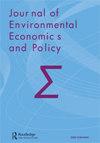气候政策、资源所有者的预期和绿色悖论:模型建立和实证考虑
IF 1.2
Q3 ENVIRONMENTAL STUDIES
Journal of Environmental Economics and Policy
Pub Date : 2022-05-11
DOI:10.1080/21606544.2022.2071344
引用次数: 9
摘要
随着环保承诺的加速,绿色悖论已经成为气候辩论的中心议题。在标准的Hotelling(1936)框架中,生产者可能将环境法规解释为对资源稀缺租金的直接威胁。他们通过将开采决策提前转移到当前时期来补偿未来的收入损失。在本文中,我们捍卫了化石燃料生产商的预期效应是不可忽视的,不能被环境规划者忽视的直觉。然而,面对来自最新文献的相互矛盾的证据和理论基础,我们认为它们对气候目标的有效影响往往被高估了,并且在合理的假设和确定的条件下可能会变小。因此,提出了一套建议,以便在即将采取的气候措施中内化这些推论。本文章由计算机程序翻译,如有差异,请以英文原文为准。
Climate policy, resource owners’ anticipations and the green paradox: model set-up and empirical considerations
ABSTRACT
With the acceleration of environmental commitments, the Green Paradox has been taking centre stage in the climate debate. In the standard Hotelling (1936) framework, producers may interpret environmental regulations as direct threats to resource scarcity rents. They compensate the future losses of revenues by forward shifting the extraction decision to the present period. In this paper, we defend the intuition behind which the anticipation effects of fossil producers are non-negligible and cannot be ignored by environmental planners. However, facing the conflicting evidence and theoretical underpinnings arising from the most recent literature, we argue that their effective impacts on climate targets tend to be over-estimated and might become smaller under reasonable assumptions and identified conditions. Accordingly, a set of recommendations are provided to internalize such inferences within upcoming climate measures.
求助全文
通过发布文献求助,成功后即可免费获取论文全文。
去求助
来源期刊

Journal of Environmental Economics and Policy
ENVIRONMENTAL STUDIES-
CiteScore
4.70
自引率
7.70%
发文量
26
 求助内容:
求助内容: 应助结果提醒方式:
应助结果提醒方式:


